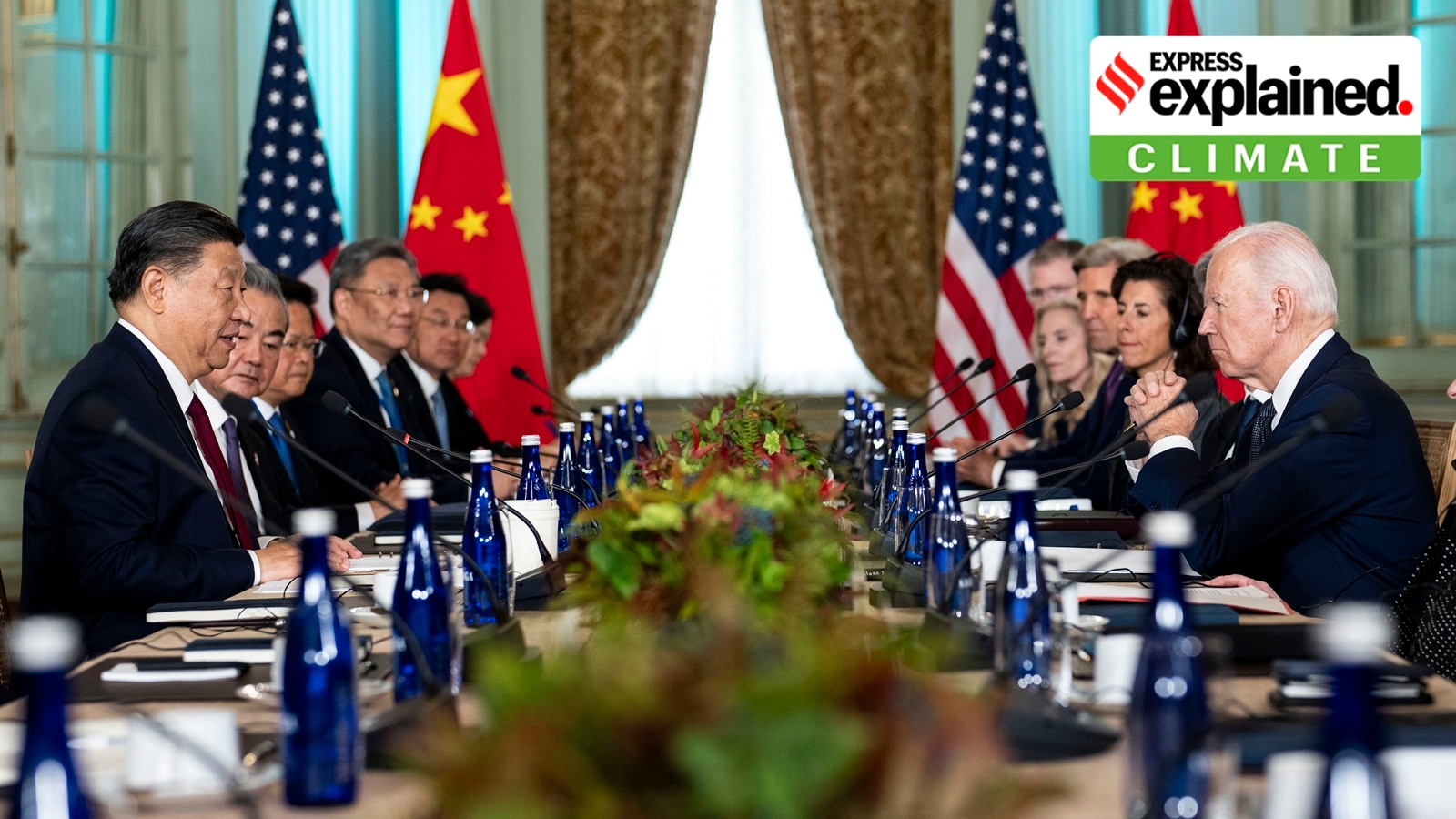What a US-China climate deal means for COP28
The deal comes at a pivotal moment for the United States, the biggest climate polluter in history, and China, currently the largest polluter. Together, they account for 38% of the world’s greenhouse gases.
 President Joe Biden Meets with China's President President Xi Jinping at the Filoli Estate in Woodside, Calif., Wednesday, Nov, 15, 2023, on the sidelines of the Asia-Pacific Economic Cooperative conference. (AP/PTI)
President Joe Biden Meets with China's President President Xi Jinping at the Filoli Estate in Woodside, Calif., Wednesday, Nov, 15, 2023, on the sidelines of the Asia-Pacific Economic Cooperative conference. (AP/PTI) The United States and China announced an agreement Tuesday evening to sharply increase clean energy, displace fossil fuels and reduce emissions that are warming the planet.
The deal comes at a pivotal moment for the United States, the biggest climate polluter in history, and China, currently the largest polluter. Together, they account for 38% of the world’s greenhouse gases.
President Joe Biden and President Xi Jinping of China met Wednesday. And in two weeks, representatives from nearly 200 countries will gather in Dubai, United Arab Emirates, as part of the UN climate talks known as COP28.
The deal between the US and China could deliver a jolt of ambition before the global talks. If the world’s two biggest polluting countries can agree to reduce their fossil fuel emissions, other countries should find it easier to follow suit.
“This definitely puts wind in the sails heading in to COP,” said New York Times reporter Lisa Friedman, who has covered climate negotiations between the US and China for years.
Friedman noted that, in the lead-up to COP21, which took place in Paris in 2015, the US and China agreed on a plan to reduce greenhouse gas emissions, using precise language that recognized that each country would have to move at its own pace.
Months later, Friedman said, “that language then ultimately became part of the language of the Paris Agreement,” when world leaders reached a landmark deal to try to limit global warming to 1.5 degrees Celsius.
Before Dubai, the fight is already raging.
“We’re in a situation where countries are debating how to get out of COP28 with political language that calls on countries to triple renewable energy capacity, double energy efficiency and also whether to call for countries to phase out fossil fuels or unabated fossil fuels,” Friedman said.
This year, perhaps as in 2015, a bilateral deal between the US and China may provide a much needed template for negotiations.
Not all climate experts are optimistic. This year’s event is being held in the UAE, one of the world’s biggest oil producers. Critics have derided this year’s conference as a farce, where governments under the influence of fossil fuel interests will make nonbinding commitments that are never achieved.
Details of the Deal
The new climate deal represents a rare point of agreement between the US and China, which are at odds over geopolitics and trade.
The countries agreed to “pursue efforts to triple renewable energy capacity globally by 2030,” with the intention “to accelerate the substitution for coal, oil and gas generation.” Both countries anticipate that they will achieve “meaningful absolute power sector emission reduction” this decade.
The agreement is short on enforcement mechanisms. But it does push forward on several fronts.
Both countries agreed that in their next set of national climate pledges, which are due next year, they would set reduction targets for all greenhouse gas emissions — not just carbon dioxide but also methane, nitrous oxide and other planet-warming gases.
China’s willingness to address methane, a step it has long resisted, is particularly notable. While it has agreed in principle to cut methane, it has not previously said it will establish concrete targets.
“Methane has been notably absent from China’s previous commitment under the Paris Agreement,” David Waskow, international climate director at the World Resources Institute, said in a statement. “This announcement is a major step because China is the world’s largest methane emitter and serious actions to curb this gas is essential for slowing global warming in the near term.”
While the agreement marks the resumption of collaborative work between the world’s two biggest polluters, and sets ambitious new targets and provides momentum going in to COP, it will not be enough to quiet the critics who say the world is still acting too slowly to address climate change.
Alden Meyer, a senior associate at E3G, an environmental research organization based in Britain, said the US-China language around displacing fossil fuels was “tortured” and did not clearly commit either country to take decisive action.
“It really is silent on the need to phase down oil and gas emissions,” he said.
The deal also does not include any promises by China to phase out its use of coal or to stop issuing permits for new coal plants and building them. Scientists say immediately reducing fossil fuel use is essential to avoid further catastrophic warming.
“It is disappointing that the two nations said nothing about the need to rapidly transition away from fossil fuels this decade, which will be a central issue at the COP28 summit,” Waskow said.
This article originally appeared in The New York Times.
- 01
- 02
- 03
- 04
- 05






































